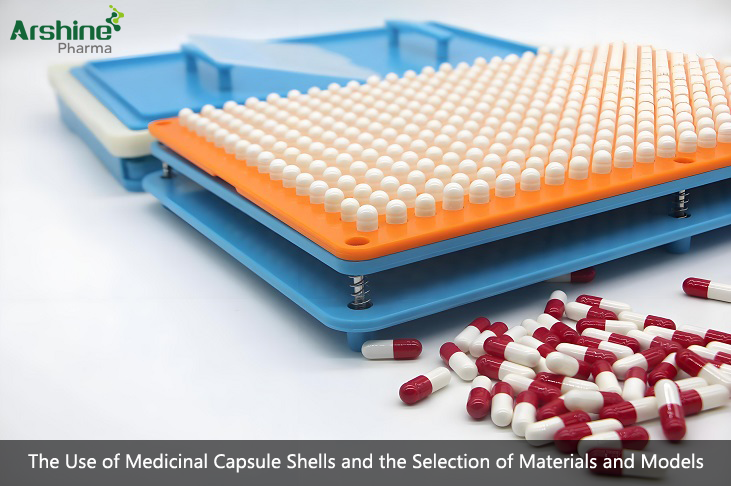
Capsule Shells: Usage, Material Selection, and Models
Capsule shells are hollow capsules used to contain medications, primarily made from pharmaceutical-grade gelatin or other suitable materials. Their purpose is to protect the stability and effectiveness of medications during transport, storage, and use, while also making them easier for patients to consume.
1. Functions of Capsule Shells
Protection of Medications
Capsule shells protect medications from external environmental factors such as humidity, oxygen, and light, which can cause degradation, spoilage, or loss of efficacy. The sealing capability of capsule shells helps isolate the medication from the external environment, enhancing its stability and shelf life.
Control of Drug Release
By selecting different materials and thicknesses for the capsule shell, and designing specific capsule structures, it is possible to control the speed and manner of drug release. For example, enteric-coated capsules remain stable in acidic gastric conditions but release medication in the intestines, preventing the drug from being broken down or released too early in the stomach. This controlled release feature can enhance drug efficacy and reduce side effects.
Ease of Consumption
The hollow design of capsule shells allows for easy filling and sealing of the medication. Patients can swallow the capsule directly or mix the medication with a small amount of water for easier ingestion. Capsule shells are typically tasteless or have a mild flavor, ensuring that the medication’s taste does not affect patient compliance.
Improvement of Drug Bioavailability
Some medications can be broken down by stomach acid or digestive enzymes when taken orally, reducing their effectiveness. Capsule shells protect the drug from these factors, enhancing bioavailability, which means the medication can be absorbed and utilized more effectively by the body, improving therapeutic outcomes.
2. Applications of Capsule Shells
Pharmaceutical Packaging
Capsule shells are a crucial component in pharmaceutical packaging. They are widely used for various types of drugs, including capsules, pills, and tablets. Capsule shells can be customized in different colors, shapes, and sizes based on the characteristics and needs of the medication, improving the appearance and identification of the drug.
Custom Drug Formulations
Some special drug formulations require capsule shells of specific shapes, sizes, or materials. Capsule shells can be tailored to meet particular treatment needs, such as using enteric-coated capsules to prevent release in the stomach or extended-release capsules to prolong the drug’s effect.
Nutraceuticals and Functional Foods
In addition to pharmaceuticals, capsule shells are used in the packaging of nutraceuticals and functional foods. They protect active ingredients from environmental influences, preserving their stability and efficacy. Many consumers opt for capsules to take dietary supplements, vitamins, and minerals for convenience and absorption.
Industrial Applications
Capsule shells also have some industrial applications. For example, in the food industry, they can encapsulate certain food additives or flavorings, while in the cosmetics industry, they may be used to package active ingredients or powdered cosmetics.
3. Selection and Use of Capsule Shells
Material Selection
Capsule shells are typically made from pharmaceutical-grade gelatin or other materials that meet medicinal standards. Gelatin is a protein derived from animal connective tissue with excellent biocompatibility and degradability. However, due to the potential risk of disease transmission from animal-derived materials, new types of capsule materials, such as plant-based capsules and synthetic polymer capsules, are being developed and researched.
When selecting capsule shells, it is important to consider the quality, safety, and suitability of the material. Ensure that the chosen capsule meets relevant pharmaceutical standards and regulations to guarantee the quality and safety of the medication.
Size and Specifications
Capsule shells come in various sizes and specifications, such as different dimensions, thicknesses, and colors. The appropriate size and specification should be selected based on the properties of the medication, dosage, and patient needs. Smaller capsules are suited for lower doses, while larger capsules accommodate higher doses. Additionally, certain medications may require specific shell thicknesses to ensure proper drug release and stability.
Quality Control
Ensuring the quality of capsule shells is vital. Manufacturers must adhere to pharmacopeial standards and quality management systems during production to ensure stable and reliable quality. Quality control includes inspection of raw materials, monitoring the production process, and testing and releasing finished products.
When using capsule shells, consider the following points:
- Follow the doctor's or pharmacist's instructions for the correct method and dosage.
- Store capsule shells in a dry, cool, well-ventilated place, avoiding direct sunlight and moisture.
- If you experience an allergic reaction or discomfort to any capsule shell or medication, inform your doctor or pharmacist promptly.
- Always read the medication instructions before use to understand how to take the medication and any precautions.
4. Trends in Capsule Shell Development
As people's attention to health increases, the demand for capsule shells is evolving. Overall, capsule shells play a key role in pharmaceutical packaging and drug formulation. They protect the stability and efficacy of medications while offering convenience to patients. With advances in technology and a greater focus on health, capsule shell development will continue to adapt to new demands and challenges.
When using capsule shells, patients should follow their doctor or pharmacist’s advice to ensure proper and safe medication use. Additionally, regulatory agencies and manufacturers must strengthen the quality control of capsule shells to ensure the safety of the public’s medication.
